中考英语常考句型总结
初中英语中考常考的八类基础句型

初中英语中考常考的八类基础句型1“主语 + 谓语”(即“主谓”句型)这一句型英汉语言结构形式完全相同,说明“某人或某物如何动作”,或者说“某人或某物自身怎样运动”。
例:They arrived in Harbin yesterday morning.分析:“they”(主语)“arrived”(谓语)。
2“主语 + 谓语 + 宾语”(即“主谓宾”句型)这一句型英汉语言的结构形式完全相同,用以说明“某人或某物做什么事情”,或者说“某人或某物发出了动作,并且其动作涉及到另一个人或物”。
例:I study English.分析:“I”(主语)“study”(谓语动作)“English”(宾语即动作涉及的对象)。
3“主语 + 谓语 + 间接宾语 + 直接宾语”(即“主谓双宾”句型)这一句型英汉语序结构相同,说明“某人为谁(间接宾语为人)做某事”,或者说“某人或物的运动涉及到两个对象,其中一个间接对象为人,另一个为物”。
例:Our teacher taught us English.分析:“our teacher”(主语)“教”(谓语动作)“us”(间接宾语)“English”(直接宾语)。
4“主语 + 谓语 + 宾语 + 宾语补足语”(即“主谓宾补”句型)这一句型说明“某人或某物要求(使、让)某人做什么”或“某人感觉某人或物怎么样”。
例: He asked her to go there.分析:“he”(主语)“asked”(谓语动作)“her”(宾语即动作涉及的对象)“to go there”(补语—补充说明宾语做什么)。
5“主语 + 系动词+ 表语”(即“主系表”句型)这一句型用以说明“某人(某物、某事、某种概念)具有什么特征或处于什么状态”。
汉语的“是”字结构属于这一英语句型的形式之一。
常用的联系动词有be, keep,lie, remain, stand, become, fall, get, go, grow, turn, look, feel, seem, smell, sound, taste, 等。
中考英语必背核心句型(60句)
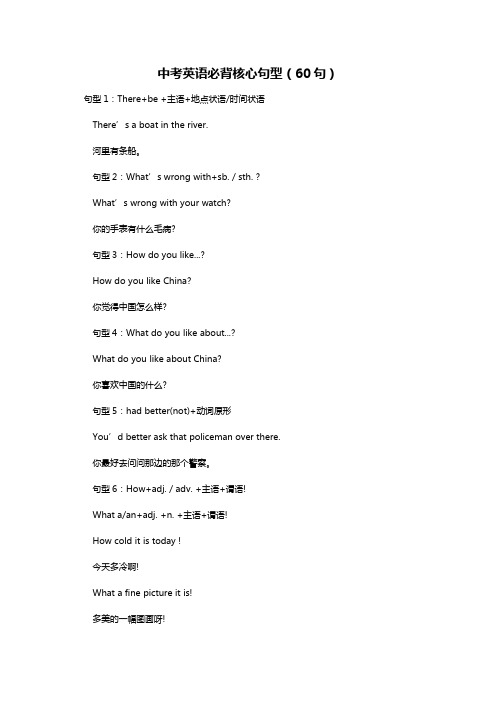
中考英语必背核心句型(60句)句型1:There+be +主语+地点状语/时间状语There’s a boat in the river.河里有条船。
句型2:What’s wrong with+sb. / sth. ?What’s wrong with your watch?你的手表有什么毛病?句型3:How do you like...?How do you like China?你觉得中国怎么样?句型4:What do you like about...?What do you like about China?你喜欢中国的什么?句型5:had better(not)+动词原形You’d better ask that policeman over there.你最好去问问那边的那个警察。
句型6:How+adj. / adv. +主语+谓语!What a/an+adj. +n. +主语+谓语!How cold it is today !今天多冷啊!What a fine picture it is!多美的一幅图画呀!句型7:Thank+sb. +for (doing) sth.Thank you for coming to see me.感谢你来看我。
句型8:So+be/ 情态动词/ 助动词+主语He is a student. So am I.他是一个学生,我也是。
句型9:... not ... until ...He didn’t have supper until his parents came back.直到他的父母回来他才吃饭。
句型10:比较级+and+比较级The baby cried harder and harder.那孩子哭得越来越厉害。
句型11:the +比较级,the +比较级The more one has,the more one wants.越有越贪。
句型12:... as +adj./ adv.+as ...…not as/so+adj/adv. +as...Do you think that art is as important as music?你认为艺术和音乐一样重要吗?Last Sunday the weather was not so wet as it is today.上个星期天的天气不如今天的天气潮湿。
中考英语必考的60个句型

中考英语必考的60个句型,趁早掌握!1。
as…as 和……一样中间必须用形容词或副词原级。
例如:This classroom is as big as that one.这间教室和那间一样大。
He runs as fast as Tom.他和汤姆跑的一样快。
否定结构:not as/so…as,“不如……"。
上面的两个句子可分别改为:This classroom is not as/so large as that one.这间教室不如那间大。
He doesn’t run as/so fast as Tom。
他跑得不如汤姆快。
2。
as soon as 一……就……用来引导时间状语从句。
若主句是一般将来时,从句要用一般现在时。
例如:I’ll tell him the plan as soon as I see him.我一看到他就告诉他这个计划。
He’ll go home as soon as he finishes his work。
他一完成工作就回家。
3。
be busy/enjoy/hate/go on/finish doing sth。
忙于/喜欢/讨厌/继续/完成做某事在enjoy, finish, hate,go on, be busy等词语后,一般用动词—ing形式作宾语。
例如:Lin Tao is busy making a model plane。
林涛正忙着做飞机模型。
My mother enjoys taking a walk after supper。
我妈妈喜欢晚饭后散步。
I hate watching Channel Five。
我讨厌看五频道。
When someone asked him to have a rest,he just went on working。
当有人让他休息一会儿时,他仍继续工作。
I have finished writing the story。
初中英语中考常考句型及例句(共九大类60个)
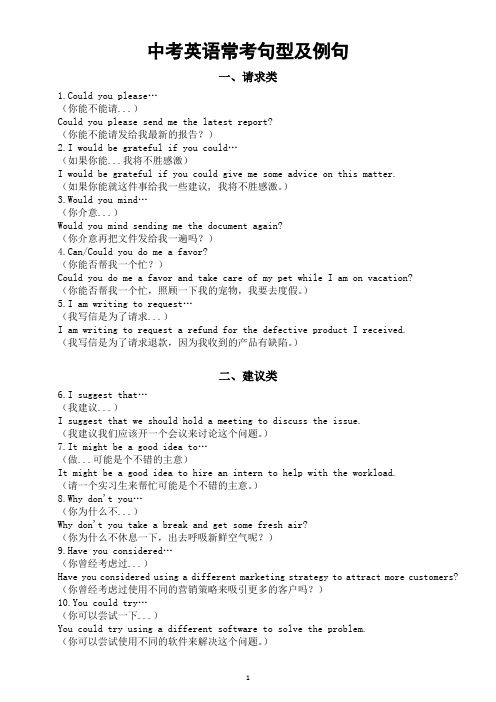
中考英语常考句型及例句一、请求类1.Could you please…(你能不能请...)Could you please send me the latest report?(你能不能请发给我最新的报告?)2.I would be grateful if you could…(如果你能...我将不胜感激)I would be grateful if you could give me some advice on this matter.(如果你能就这件事给我一些建议, 我将不胜感激。
)3.Would you mind…(你介意...)Would you mind sending me the document again?(你介意再把文件发给我一遍吗?)4.Can/Could you do me a favor?(你能否帮我一个忙?)Could you do me a favor and take care of my pet while I am on vacation?(你能否帮我一个忙,照顾一下我的宠物,我要去度假。
)5.I am writing to reque st…(我写信是为了请求...)I am writing to request a refund for the defective product I received.(我写信是为了请求退款,因为我收到的产品有缺陷。
)二、建议类6.I suggest that…(我建议...)I suggest that we should hold a meeting to discuss the issue.(我建议我们应该开一个会议来讨论这个问题。
)7.It might be a good i dea to…(做...可能是个不错的主意)It might be a good idea to hire an intern to help with the workload.(请一个实习生来帮忙可能是个不错的主意。
中考英语短语句型大全-必考必背
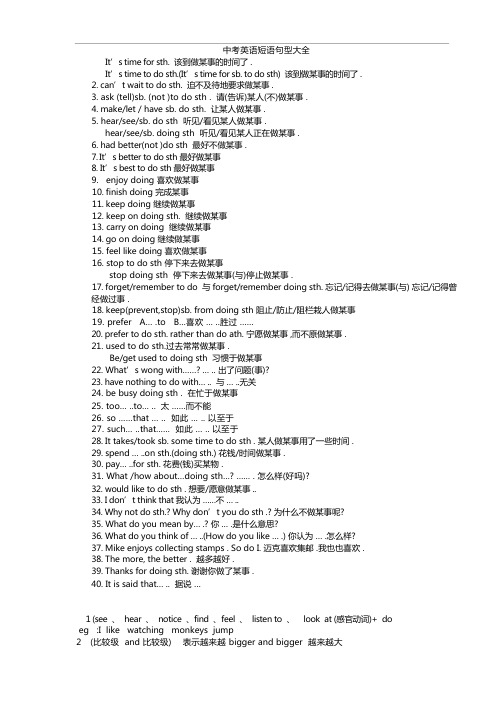
中考英语短语句型大全It’s time for sth. 该到做某事的时间了 .It’s time to do sth.(It’s time for sb. to do st h) 该到做某事的时间了 .2. can’t wait to do st h. 迫不及待地要求做某事 .3. ask (tell)sb. (not )to do sth . 请(告诉)某人(不)做某事 .4. make/let / have sb. do sth. 让某人做某事 .5. hear/see/sb. do sth 听见/看见某人做某事 .hear/see/sb. doing sth 听见/看见某人正在做某事 .6. had better(not )do sth 最好不做某事 .7. It’s better to do sth 最好做某事8. It’s best to do sth 最好做某事9. enjoy doing 喜欢做某事10. finish doing 完成某事11. keep doing 继续做某事12. keep on doing sth. 继续做某事13. carry on doing 继续做某事14. go on doing 继续做某事15. feel like doing 喜欢做某事16. stop to do sth 停下来去做某事stop doing sth 停下来去做某事(与)停止做某事 .17. forget/remember to do 与 forget/remember doing sth. 忘记/记得去做某事(与) 忘记/记得曾经做过事 .18. keep(prevent,stop)sb. from doing sth 阻止/防止/阻栏栽人做某事19. prefer A… .to B…喜欢… ..胜过……20. prefer to do sth. rather than do ath. 宁愿做某事 ,而不原做某事 .21. used to do sth.过去常常做某事 .Be/get used to doing sth 习惯于做某事22. What’s wong with……? … .. 出了问题(事)?23. have nothing to do with… .. 与… ..无关24. be busy doing sth . 在忙于做某事25. too… ..to… .. 太……而不能26. so ……that … .. 如此… .. 以至于27. such… ..that…… 如此… .. 以至于28. It takes/took sb. some time to do sth . 某人做某事用了一些时间 .29. spend … ..on sth.(doing sth.) 花钱/时间做某事 .30. pay… ..for sth. 花费(钱)买某物 .31. What /how about…doing sth…? …… . 怎么样(好吗)?32. would like to do sth . 想要/愿意做某事 ..33. I don’t think that 我认为……不… ..34. Why not do sth.? Why don’t you do sth .? 为什么不做某事呢?35. What do you mean by… .? 你… .是什么意思?36. What do you think of … ..(How do you like … .) 你认为… .怎么样?37. Mike enjoys collecting stamps . So do I. 迈克喜欢集邮 .我也也喜欢 .38. The more, the better . 越多越好 .39. Thanks for doing sth. 谢谢你做了某事 .40. It is said that… .. 据说…1 (see 、 hear 、 notice 、find 、feel 、 listen to 、 look at (感官动词)+ doeg :I like watching monkeys jump2 (比较级 and 比较级) 表示越来越 bigger and bigger 越来越大3 a piece of cake =easy 小菜一碟(容易)4 agree with sb 赞成某人5 all kinds of 各种各样 a kind of 一样6 all over the world = the whole world 整个世界7 along with 同……一道,伴随…eg : I will go along with you 我将和你一起去the students planted trees along with their teachers8 As soon as 一怎么样就怎么样9 as you can see 你是知道的10 ask for …… 求助向…要… (直接接想要的东西) eg : ask you for my book11 ask sb for sth 向某人什么13 at the age of 在……岁时 I am at the age of sixteen14 at the beginning of …… …… 的起初;… …的开始15 at the end of +地点/+时间最后;尽头 eg : At the end of the day16 at this time of year 在每年的这个时候17 be /feel confident of sth /that + 从句感觉/对什么有信心,自信eg : I am / feel confident of my spoken English I feel that I can pass the test19 be able to (+ v 原) = can (+ v 原) 能够……eg : She is able to sing She can sing20 be able to do sth 能够干什么 eg :she is able to sing21 be afraid to do (of sth 恐惧,害怕… … eg : I'm afraed to go out at night I'm afraid of doing sth22 be allowed to do 被允许做什么eg: I'm allowed to watch TV 我被允许看电视 I should be allowed to watch TV 我应该被允许看电视23 be angry with sb 生某人的气 eg : Don't be angry with me24 be angry with(at) sb for doing sth 为什么而生某人的气25 be as…原级…as 和什么一样 eg : She is as tall as me 她和我一样高26 be ashamed to 羞愧27 be away from 远离28 be away from 从… …离开29 be bad for 对什么有害 be good for 对什么有好处eg : Reading books in the sun is bad for your eyes 在太阳下看书对你的眼睛不好30 be born 出生于31 be busy doing sth 忙于做什么事 be busy with sth 忙于…32 be careful 当心;小心 look out = watch out33 be different from…… 和什么不一样34 be famous for = be known for 以……著名35 be friendly to sb 对某人友好36 be from = come from 来自37 be full of 装满… …的 be filled with 充满 eg: the glass is full of water the glass is filled with water38 be glad+to+do/从句39 be going to + v(原) 将来时40 be good at(+doing) = do well in 在某方面善长 , 善于41 eg : Reading aloud is good for your English42 be happy to do 很高兴做某事43 be helpful to sb 对某人有好处eg : Reading aloud is helpful to you 大声朗读对你有好处44 be in good health 身体健康45 be in trouble 处于困难中 eg : She is in trouble46 be interested in 对某方面感兴趣47 be late for = come late to 迟到 eg: Be late for class 上课迟到48 be like 像… … eg : I'm like my mother49 be mad at 生某人的气50 be made from 由……制成(制成以后看不见原材料)51 be made of 由……制成(制成以后还看得见原材料 )be made into 被…制成be made in 由。
中考英语常见句型
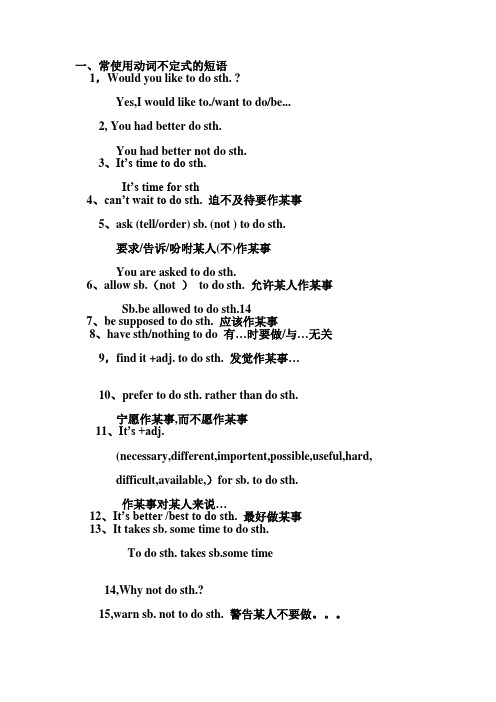
一、常使用动词不定式的短语1,Would you like to do sth. ?Yes,I would like to./want to do/be...2, You had better do sth.You had better not do sth.3、It’s time to do sth.It’s time for sth4、can’t wait to do sth. 迫不及待要作某事5、ask (tell/order) sb. (not ) to do sth.要求/告诉/吩咐某人(不)作某事You are asked to do sth.6、allow sb.(not )to do sth. 允许某人作某事Sb.be allowed to do sth.147、be supposed to do sth. 应该作某事8、have sth/nothing to do 有…时要做/与…无关9,find it +adj. to do sth. 发觉作某事…10、prefer to do sth. rather than do sth.宁愿作某事,而不愿作某事11、It’s +adj.(necessary,different,importent,possible,useful,hard,difficult,available,)for sb. to do sth.作某事对某人来说…12、It’s better /best to do sth. 最好做某事13、It takes sb. some time to do sth.To do sth. takes sb.some time14,Why not do sth.?15,warn sb. not to do sth. 警告某人不要做。
二、常用动名词的短语1、enjoy /like /love doing sth. 喜欢做某事2、keep /keep on /carry on / go on doing sth.继续做某事3、feel like doing sth. 想要做某事4、practice doing sth. 练习作某事5、give up doing sth. 放弃作某事6、be good at/ do well in doing sth. 擅长作某事7、pay attention to doing sth. 注意作某事8、what about/ how about doing sth.….怎么样(好吗)?9、Thank you for doing sth. 为…感谢某人10、mind doing sth. 介意作某事11、be used for doing sth.= be used to do sth. 、被用来作某事12、spend …(in) doing sth. 花时间作某时13、be busy doing/ with sth. 忙于作某事14、finish doing sth. 作完某时15、look forward to doing. 盼望做某事16、prefer doing sth. to doing sth. 喜欢…胜过…17、be/get used to doing sth. 习惯作某事18、keep / stop/ prevent sb. from doing sth.阻止某人作某事三、省略动词不定式的短语1、一看二听三使役see/ hear/ feel/ notice/ look at /listen to sb. do sth. 但是中考考点:Sb,is/was heard to do sth. (被动语态的运用)看见/听见/感觉/注意某人作某事make /let /have sb. do sth. 使/让某人做某事、Sb is/was made to do sth.2、help sb. (to) do sth/ with sth.帮助某人作某事3、had better (not) do sth. 最好(不)做某事4、Why don’t you/ not do sth.为什么不作某事5、Would /Will / Could you please (not) do sth.请你(不)作某事好吗?四、同义词比较1、stop to do sth. 停下正在做的事去作另一件事stop doing sth. 停止正在作的事eg. When the teacher came into the classroom,the students stopped talking.After he worked for an hour, he stopped to have a rest.2、forget / remember to do sth.忘记/记得要去作某事forget / remember doing sth.忘记记得曾经做过某事eg. Please remember to bring my book to school.I remember doing my homework3、used to do sth. 过去常常作某事(中考考点,习惯短语的运用!短文填空,词义与句意的结合!)be used to do sth. 被用来作某事be used to doing sth. 习惯于作某事eg. My father used to smoke.Wood is used to make paper.I am used to getting up early.4、So +be/助动词/情态动词+ 主语(中考考点,习惯句型的运用!填空,词义与句意的结合!,关键是动词的正确选用!)…也一样So +主语+be/助动词/ 情态动词是呀,表示赞同别人的观点Neither + be /助动词/ 情态动词+主语…也不一样(用于否定句) (Me neither. 今年中考注重课本基础知识的综合应用!)eg. He has been to Beijing. So have I.It’s a fine day. So it is.She doesn’t like eggs. Neither do I.5、too…to do sth. 太…而不能…so +adj. /adv + that(从句) 如此…以致…such +(a/an +adj.)+n.+ that(从句)如此…以致…(not) enough (for sb.) to do sth.(对某人来说)做某事(不)够eg. The boy is too young to go to school.The boy is so young that he can’t go to school.He is such a young boy that he can’t go to school.The boy is not old enough to go to school.五、常考知识点1、become /get/turn/lie ...+ adj.(中考考点,习惯句型的运用!短文填空,词义与句意的结合,adj.的正确运用!)2,keep +adj. 保持…状态/keep sb./sth. + adj.(中考考点,习惯句型的运用!短文填空,词义与句意的结合,词性辨析,正确词性,词形的运用!)We often keep our classroom __________.A, clean B,to clean C, cleaning D, cleanedkeep (sb.) doing sth. 继续做某事/使某人老是做某事eg. Everyone should not keep others waiting for a long time.It’s too late, but he s till keeps working.2、make + n. 使某人成为make + sb. + adj. 使某人…make sb. do sth. 使某人做某事Sb. be made to sth. 某人被迫做某事eg. We made Peter our monitor.Books make us happy.He often makes me laugh.The workers were made to work 12 hours a day.3、I don’t think that 我认为…不eg. I don’t think you are right.4、It’s /has been+ some time +since+一般过去时…自从…以来有多久了eg. It has been two years since we met last time.6、What do you mean by?= What does .. mean?......是什么意思?eg. What do you mean by “computer”?=What does “computer”mean?7、What do you think of…=How do you like …?你认为…怎么样?eg. What do you think of this film ?How do you like this film?。
中考英语中常出现的常考短语和句型

中考英语中常出现的常考短语和句型中考英语中常出现的常考短语和句型随着考试的时间一天天临近,随着考试的时间一天天临近,回归课本,回归课本,回归课本,夯实基础知识是十分必要的,夯实基础知识是十分必要的,夯实基础知识是十分必要的,下面下面是历年中考中常出现的常考短语、句型总结如下,仅供参考。
1.kinds of 各种各样的各种各样的2. either…or…或者……或者……,不是……就是……3. neither…nor…既不……也不……4. Chinese tea without, anything in it 中国清茶中国清茶5. take a seat 就坐就坐6. home cooking 家常做法家常做法家常做法7. be famous for 因……而著名而著名8. on ones way to 在……途中途中9. be sick/ill in hospital 生病住院生病住院10. at the end of 在……的尽头,在……的末尾的末尾11. wait for 等待等待12. in time 及时及时及时 13. make one’s way to…往……(艰难地)走去(艰难地)走去14. just then 正在那时正在那时正在那时 15. first of all 首先,第一首先,第一16. go wrong 走错路走错路走错路 17. be/get lost 迷路迷路迷路 18. make a noise 吵闹,喧哗吵闹,喧哗19. get on 上车上车上车 20. get off 下车下车下车 21. stand in line 站队站队22. waiting room 候诊室,候车室候诊室,候车室候诊室,候车室 23. at the head of……在……的前头的前头24. laugh at 嘲笑嘲笑嘲笑 25. throw about 乱丢,抛散乱丢,抛散乱丢,抛散 26. in fact 实际上实际上实际上 27. at midnight 在半夜在半夜在半夜 28. have a good time=enjoy oneself 玩得愉快玩得愉快29. quarrel with sb. 和某人吵架和某人吵架30. take one’s temp e rature erature 给某人体温给某人体温31. have/get a pain in…某处疼痛某处疼痛32. have a headache 头痛头痛33. as soon as… 一……就……34. feel like doing sth. 想要干某事想要干某事35. stop…from doing sth. 阻止……干某事干某事36. fall asleep 入睡入睡入睡 37. again and again 再三地,反复地再三地,反复地再三地,反复地 38. wake up 醒来,叫醒醒来,叫醒醒来,叫醒 39. instead of 代替代替代替 40. look over 检查检查检查41. take exercise运动运动42. had better(not) do sth. 最好(不要)干某事最好(不要)干某事43. at the weekend 在周末在周末44. on time 按时按时按时45. out of从……向外向外46. all by oneself 独立,单独独立,单独47. lots of=a lot of 许多许多48. no longer/more=not…any longer/more 不再不再不再49. get back 回来,取回回来,取回回来,取回50. sooner or later迟早迟早51. run away 逃跑逃跑逃跑52. eat up 吃光,吃完吃光,吃完吃光,吃完53. run after 追赶追赶追赶54. take sth. with sb. 某人随身带着某物某人随身带着某物55. take(good) care of…=look after…(well) (好好)照顾,照料(好好)照顾,照料56. think of 考虑到,想起考虑到,想起考虑到,想起57. keep a diary 坚持写日记坚持写日记58. leave one by oneself 把某人单独留下把某人单独留下59. harder and harder 越来越厉害越来越厉害60. turn on打开(电灯、收音机、煤气等)61. turn off 关重温重点句型重温重点句型1.So + be/助动词/情牵动词/主语./助动词/情牵动词/主语./助动词/情牵动词/主语.前面陈述的肯定情况也适于另一人(物)时,常用到这种倒装结构,表示“另一人(物)也如此。
中考英语作文句型

中考英语作文句型中考英语作文句型11.主语+is + the + 最高级+ 名词+(that)+ I have ever seen (known/heard/had/read)Helen is the most beautiful girl that I have ever seen。
海伦是我所看过最美丽的女孩。
Mr. Chang is the kindest teacher that I have ever had。
张老师是我曾经遇到最仁慈的教师。
Yao Ming is the tallest basketball player that I have ever seen。
姚明是我所见过的最高的篮球运动员Liu Xiang is the most hardworking sportsman that I have ever seen。
刘翔是我所见过的最勤奋的运动员。
2.Nothing is more important + than + to do sth.Nothing is more important than to keep fit。
没有比保持健康更重要的事。
Nothing is more important than to potect our environment。
没有什么比环保更重要的事。
Nothing is more important than to gain knowledge。
没有什么比学习知识更重要的事。
3.There is no denying that + S + V (不可否认的)There is no denying that Nothing is more important than to potectour environment.不可否认的,没有什么比环保更重要的事。
中考英语作文句型21. 6月2日下午,我正乘火车从上海到沈阳回家的途中。
On the afternoon of July 2nd, I was traveling from Shanghai back to Shenyang by train.2.一大早,我们就出发了。
中考英语必背80个固定短语句型
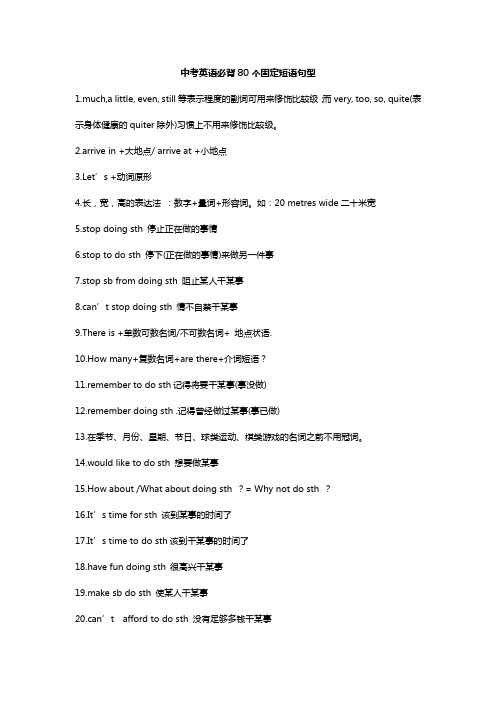
中考英语必背80个固定短语句型1.much,a little, even, still等表示程度的副词可用来修饰比较级;而very, too, so, quite(表示身体健康的quiter除外)习惯上不用来修饰比较级。
2.arrive in +大地点/ arrive at +小地点3.Let’s +动词原形4.长,宽,高的表达法:数字+量词+形容词。
如:20 metres wide二十米宽5.stop doing sth 停止正在做的事情6.stop to do sth 停下(正在做的事情)来做另一件事7.stop sb from doing sth 阻止某人干某事8.can’t stop doing sth 情不自禁干某事9.There is +单数可数名词/不可数名词+ 地点状语.10.How many+复数名词+are there+介词短语?11.remember to do sth记得将要干某事(事没做)12.remember doing sth .记得曾经做过某事(事已做)13.在季节、月份、星期、节日、球类运动、棋类游戏的名词之前不用冠词。
14.would like to do sth 想要做某事15.How about /What about doing sth ?= Why not do sth ?16.It’s time for sth 该到某事的时间了17.It’s time to do sth该到干某事的时间了18.have fun doing sth 很高兴干某事19.make sb do sth 使某人干某事20.can’t afford to do sth 没有足够多钱干某事21.can’t stand doing sth 不能忍受干某事22.mind doing sth 介意干某事23.try to do sth 尽力干某事24.finish doing sth 结束干某事25.decide to do sth 决定干某事26.plan to do sth 计划干某事27.It +takes +sb.+时间+to do sth28.sb. +spend +时间+on sth (in doing sth )29.Can you do sth ?你可以做,,,吗30.be busy doing sth 忙于干某事31.called = named = with the name (of)32.at the age of = when sb was/ were ….33.because of 后面接名词、代词、名词性短语、what从句34.keep doing sth . 表示不间断地持续做某事或一直做某事。
中考英语必考重要句型总结

中考英语必考重要句型总结1. It's+adj.+for sb.+to do sth. 对某人来说做某事怎么样,如:It is dangerous for children to play in the street. 孩子们在街上玩是很危险的。
2. It's time for sth. 是干某事的时间了;It's time(for sb.)to do sth.该干某事了。
如:①It's time for the meeting. 该开会了。
②It's time for us to go to school. 我们该上学了。
3. It takes sb. some time to do sth.做某事花某人一些时间。
sb. spend some time/money on sth./(in)doing sth. 某人花时间(金钱)在某事上/花时间(金钱)干某事。
sth. cost sb. some money 某事花某人一些钱。
pay some money for sth.为某事(物)付钱。
如:① It took me two hours to write the letter. 写这封信花了我两小时的时间。
② He spends half an hour(in)reading English every morning.他每天早上花半小时读英语。
③ He spends one hour on the housework every day. 他每天花一小时做家务。
④ The bike cost me 500 yuan. 这辆自行车花了我500元。
⑤ I spent 500 yuan on the bike. 我买这辆自行车花了500元。
⑥ I paid 500 yuan for the bike. 我花了500元买这辆自行车。
重要提示:cost主语一般为物;spend, pay主语一般为人。
中考英语重点句型(基础、对话和写作)

初中英语重要句型总结其中含有基本句型、对话句型以及写作句型:1:There+be +主语+地点状语/时间状语There's a boat in the river.河里有条船。
There are seven days in a week.一周有七天。
2:What's wrong with+sb./sth.?What's wrong with you?你怎么啦?What's wrong with your watch?你的手表有什么毛病?3:How do you like...?How do you like China?你觉得中国怎么样?4:What do you like about...?What do you like about China?你喜欢中国的什么?5:had better(not)+动词原形You'd better ask that policeman over there.你最好去问问那边的那个警察。
6:How+adj./adv.+主语+谓语!What a/an+adj.+n.+主语+谓语!How cold it is today !今天多冷啊!What a fine picture it is!多美的一幅图画呀!7:Thank+sb.+for(doing)sth.Thank you for coming to see me.感谢你来看我。
8:So+be/情态动词/助动词+主语He is a student.So am I.他是一个学生,我也是。
9:...not...until...He didn't have supper until his parents came back.直到他的父母回来他才吃饭。
10:比较级+and+比较级The baby cried harder and harder.那孩子哭得越来越厉害。
11:the +比较级,the +比较级The more one has,the more one wants.越有越贪。
[精]中考英语常考的重点句型及短语汇总
![[精]中考英语常考的重点句型及短语汇总](https://img.taocdn.com/s3/m/b7c1f0500c22590103029d51.png)
中考英语常考的重点句型及短语汇总一、重点句型1.So + be/助动词/情态动词/主语.前面陈述的肯定情况也适于另一人(物)时,常用到这种倒装结构,表示“另一人(物)也如此。
”前面陈述的否定情况也适于另一人(物)时,常用“Neither/ Nor + be/助动词/情态动词+主语.”这种倒装结构。
注意:“So+主语+be/助动词/情态动词.”这一句型常用于表示赞同,进一步肯定对方的看法,表示“的确如此。
”“是呀。
”2.Turn right/leftat the first/second/…crossing.这一指路的句型意为“在第一/二/……个十字路口向右/左拐。
”相当于Take the first /second/…turning on theright/left.3.It takes sb.some time to do sth.此句型表示“干某事花了某人一段时间。
”其中的it是形式主语,后面的动词不定式(短语)才是真正的主语.4.…think/find + it + adj. + to do sth.此句型中的it是形式宾语,不可用其它代词替代,形容词作宾语的补足语,后面的动词不定式(短语)才是真正的宾语。
5.What’s wrong with…?此句型相当于What’s the matter/ trouble with…?后跟某物作宾语时,意为“某物出什么毛病了?”后跟某人作宾语时,意为“某人怎么了?”6.too…to…在so…that…复合句中,that后的句子是否定句时,常与简单句too…to…(太……而不能……)进行句型转换。
在so…that…复合句中,that后的句子是肯定句时,常与简单句…enough to…进行句型转换.7.Sorry to hear that.全句应为I’m sorry to hear that. 意为“听到此事我很难过(遗憾)。
”常用于对别人的不幸表示同情、遗憾之意。
中考英语常用常考万能句型汇编

一、个人情况1. 毕竟,这个孩子太小,还不能上学。
After all, the kid is too young to go to school.2. 我来自中国。
I come from China.3. 我的梦想会实现的。
My dream will come true.4. 她过去靠卖书为生。
She used to earn her living on selling books.5. 我家离学校不远。
My home isn’t far from the school.6. 我喜欢去钓鱼。
I enjoy going fishing.7. 我长大后想成为一名老师。
I would like to be a teacher when I grow up.8. 我每天都过得很愉快。
I have a good time every day.9. 我乐于和平地生活。
I enjoy living in peace.10. 我喜欢浏览英语报纸。
I like looking through English newspapers.11. 我乐于和别人交朋友。
I enjoy making friends with others.12. 我一点都不喜欢抽烟。
I don’t like smoking at all.13. 从今以后,我不但要更加努力学习还要尽力取得更好的成绩。
From now on, I not only study harder but also try my best to get better grades.14. 我偶尔喜欢去购物。
I like to go shopping now and then.15. 我们一做完饭就应该把火灭掉。
We should put out the fire as soon as we finish cooking.16. 我不喜欢炫耀自己。
I don’t like to show off myself.17. 我以前在电脑游戏上花费了很多时间以至于我在学习上失去了兴趣。
中考英语必备50个句型

1. It ’s important for sb. to do sth.句型是It is +adj. +for (of)sb. to do sth. 多读书对你有益。
多读书对你有益。
It is good for you to read more books. 我犯这样的错误很傻。
我犯这样的错误很傻。
It is silly of me to make such mistakes. 注意:当人称代词前用介词for 的时候,形容词是修饰这件事情的,当人称代词前介词用of 的时候,则形容词是描述那个人的品质的。
则形容词是描述那个人的品质的。
2. I t ’s time for doing/ to do sth.该是走的时候了。
该是走的时候了。
It is time to leave. = It is time for leaving. 注意:也可以加for sb. 表示是某人该做某事的时间了。
表示是某人该做某事的时间了。
It is time for us to leave. 该是我们走的时候了。
该是我们走的时候了。
3. It ’s two meters (years) long (old).句型是:sth. + be +数词数词 + 单位单位 + 形容词形容词这栋大楼20米高。
米高。
This building is 20 meters high. 这位老人有80岁高龄了。
岁高龄了。
This man is eighty years old now. 这条蛇足有三米多长。
这条蛇足有三米多长。
This snake is more than three meters long. 注意:可以将后面的名词和单位变成复合形容词,放于名词前修饰名词。
可以将后面的名词和单位变成复合形容词,放于名词前修饰名词。
The eighty-year-old man is very healthy and energetic. 这位八十岁的老人很健康而且充满活力。
中考英语作文常用句型
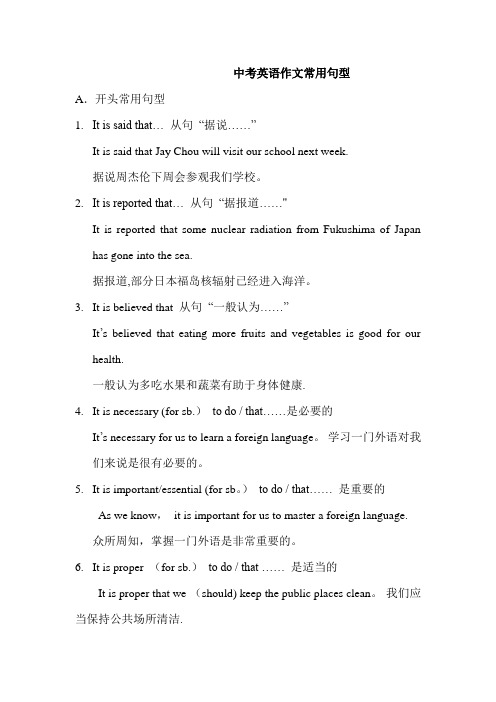
中考英语作文常用句型A.开头常用句型1.It is said that… 从句“据说……”It is said that Jay Chou will visit our school next week.据说周杰伦下周会参观我们学校。
2.It is reported that… 从句“据报道……"It is reported that some nuclear radiation from Fukushima of Japan has gone into the sea.据报道,部分日本福岛核辐射已经进入海洋。
3.It is believed that 从句“一般认为……”It’s believed that eating more fruits and vegetables is good for our health.一般认为多吃水果和蔬菜有助于身体健康.4.It is necessary (for sb.)to do / that……是必要的It’s necessary for us to learn a foreign language。
学习一门外语对我们来说是很有必要的。
5.It is important/essential (for sb。
)to do / that…… 是重要的As we know,it is important for us to master a foreign language.众所周知,掌握一门外语是非常重要的。
6.It is proper (for sb.)to do / that …… 是适当的It is proper that we (should) keep the public places clean。
我们应当保持公共场所清洁.7.It is urgent (for sb。
) to do / that ……是紧急的It’s urgent for us to protect the environment now。
- 1、下载文档前请自行甄别文档内容的完整性,平台不提供额外的编辑、内容补充、找答案等附加服务。
- 2、"仅部分预览"的文档,不可在线预览部分如存在完整性等问题,可反馈申请退款(可完整预览的文档不适用该条件!)。
- 3、如文档侵犯您的权益,请联系客服反馈,我们会尽快为您处理(人工客服工作时间:9:00-18:30)。
近义词辨析Set 11. learn、study:learn 虽然可指学习的过程,但更侧重指学到的成果,因此常译为“学到”、“学会”;而study 则侧重指学习过程。
如:He studied hard and learned English very well. 他努力学习,把英语学得很好。
2. fast、quick:fast 表示“快”,侧重指速度方面。
如:She ran as fast as she could. 她有多快就跑多快。
You are reading too fast for me to follow. 你读得太快,我跟不上。
quick 通常表示某一动作来得突然或时间持续很短,有时还含有匆忙之意(但通常不指动作的频率)。
如:He gave her a quick kiss. 他突然吻了她一下。
He hada quick look at it. 他匆匆地扫了一眼。
3. ordinary、common:ordinary 意为“普通的”、“平凡的”,强调合乎常规、并不特殊。
如:in ordinary dress 穿便服an ordinary working day 一个普通工作日common 意为“常见的”、“不足为奇的”,强调出现的次数频繁或范围广泛。
如: Is this word in common use? 这是常用词吗?4. provide、supply:按传统语法,在provide (supply) sb. with sth. 这一句型中,其中的介词with 不能省略,即两者均不能接双宾语;另外,在provide sth for sb.与supply sth to sb.这两个结构中,要分别用介词for 和to。
5. must、have to:强调重点不同:两者都表示“必须”,但must 侧重于说话者的主观看法,认为有必要或有义务去做某事;have to 则重于客观需要,含有“不得不”或“被迫”之意。
如:You must go now. (I want you to go now) 你必须现在就走。
If I buy that car,I’ll have to borrow some money. 如果我要买那辆汽车,我得借些钱。
6. different、various:different 表示“不同的”,指的可能是种类不同、不相像、不一样、不是同一个等,强调“异”。
如:Mary and Jane are quite different. 玛丽与简大不一样。
various 表示“各种各样的”、“各不相同的”等,主要指彼此不同且种类繁多, 强调“异”而“多”。
如:There are various ways of cooking an egg. 鸡蛋有各种各样的煮法。
7. be used to、used to:be used to 意为“习惯于”,其中的to 是介词,所以其后要接名词或动名词(不能接动词原形)He is used to looking after himself. 他已习惯于自己照顾自己。
used to 意为“过去经常”,其中的to 是不定式符号,而不是介词,所以其后只接动词原形(不能接动名词)。
如:He used to live in Paris. 他过去一直住在巴黎。
8. quiet、silent:quiet 表示“安静的”、“寂静的”。
指物时,表示没有喧闹或没有骚动,处于一种静止的状态或宁静的环境,如:Can’t you keep the children quiet? 你能不能让孩子们静一静?silent 着重指沉默无语或没有声音,但不一定指没有动作或活动,如a silent film指无声电影,a silent machine 指没有噪音的机器,read silently 指默读,等等。
再如:Why are you so silent? 你为什么沉默不语?9. job、work:两者均可表示“工作”,但job 主要指雇佣有报酬的工作,是可数名词;而work 指“工作”、“劳动”,是一个含义极广的常用词,它的基本意思指需要付出努力的工作或劳动,是不可数名词。
10. include、contain:include 的宾语只能是整体中的一部分或是其要素之一,而不能是所谈事物的全体或所有要素。
如:Five were killed, including a baby. 共有六人死亡,其中有一个婴儿。
contain 表示“包含”,其实是指其内装有,即指某种较大的东西内装有较小的东西,其宾语可以是整体的一部分,也可以是其全体。
如:Sea water contains salt. 海水中含有盐分。
Set 21. look、see、watch:词义上看:look 通常表示主动地、有意识地“看”,侧重指看的行为;see 通常指看的客观结果,即“看见”;watch 也指有意识地看,但往往指仔细地盯着看事物的变化。
如:I looked hard but saw nothing. 我认真看,但什么也没看见。
The cat is watching the mouse. 猫儿盯着老鼠。
If you watch (look) carefully, you will see how I do it. 你要是仔细观察(看),你就能看出我是怎样做的。
2. dress、wear、put on:从所接宾语来看:dress 要接“人”作宾语(不接“衣”作宾语),而其余的则要接“衣”作宾语(而不接“人”作宾语)。
从表示动作与状态来看:wear 通常指穿着衣服的状态,put on 通常指穿衣的动作,而dress 既可指动作也可以指状态。
3. speak、talk、say、tell:speak 强调单方的“说”或“讲”,一般用作不及物动词,要表示“对某人说(某事)”,可用speak to [with] sb (about sth)。
talk 强调双方“交谈”,一般用作不及物动词,表示“同某人谈论(某事)”,可用talk to [with] sb (about sth)。
say 强调说话内容,一般用作及物动词。
表示“对某人说”,可用say to sb。
tell 表示“告诉”,可接双宾语,双宾语易位时用介词to 引出间接宾语。
4. discover、invent:discover 主要表示“发现”原来已经存在的东西,invent 主要表示“发明”原来不存在的东西。
Franklin discovered electricity, but Edison invented the electric light bulb.5. discover、find:两者都可表示“发现”,有时可换用(discover 更正式)。
但是,若要表示第一次发现以前没有人知道的东西、地方、事实等,则用discover。
6. divide 和separate:两者均可表示“分开”:divide 通常指把整体分为若干部分,其后常接介词into; 而separate 通常指把原来连在一起或靠近的东西分隔开来,其后常接介词from。
The world is divided into seven continents. 世界被分成七大洲。
This patient should be separated from the others. 这个病人应该隔离。
7. earth、world、globe earth 是人类所居住的这个行星的名字──“地球”( 其前用the)。
有时也指“大地”、“地面”(ground)或“泥土”(soil) (其前一般不用the)。
world 指“世界”(其前用the),有时也指“全世界的人”(其前用the)。
globe 指“地球”,强调圆球形状(其前用the),一般不宜多用,也指“地球仪”(可数)。
8. draw、pull、drag:三者都可表示“拉”,如果表示将某物拖动了位臵,用draw 或pull 均可以。
如果没有位臵变化,通常用pull。
与draw 或pull 相比,drag 侧重指用力拖或拉。
9. damage、destroy、ruin:damage 表示“损害”、“损坏”,通常是指部分性的损坏,往往暗示损坏后价值、效率、功能等会降低,destroy 表示“毁坏”, 通常指彻底的毁掉或毁灭, 往往暗示无法或很难修复ruin 表示“毁坏”、“毁灭”,指彻底的毁坏,破坏的原因通常是自然现象、年龄、疏忽等,在真正具体地摧毁或破坏某座建筑物时,通常不用ruin。
10. habit、custom:habit 通常指一个人长时间养成的自然“习惯”,一旦养成了这种habit 之后,人便会自然而然甚至是情不自禁地去做。
custom 则指一个民族或一个社会在发展过程中长期沿袭下来的礼节、风俗和习惯。
Set 31. close、shut: 表示“结束(会议等)”、“关闭(交通等)”、“遮住(表面)”等,通常要用close (不用shut)。
表示“禁闭”,通常用shut(不用close)。
He was shut in the bedroom. 他被关在卧室里。
2. cure、treat:用作动词,两者都可表示“治疗”,但含义有区别:cure 通常强调结果,指治愈某种疾病或某人的疾病;而treat 则通常强调过程,指对病人进行诊断和治疗, 但不含治好的意思。
3. country、nation、state:country 侧重指国土或疆域;nation 侧重国民或民族;而state 则侧重指政权或国家机器(通常大写第一个字母)。
如:China is a large country. 中国是一个疆域广大的国家。
The whole nation is [are] rejoicing. 全国人民欢天喜地。
Railways in China belong to the State. 中国的铁路属于国家。
4. cost、spend、take:cost 的主语通常是事或物(包括形式主语it),不能是人;spend 的主语只能是人, 不能是事或物;take 的主语可以是事或物(包括形式主语it)也可以是人。
cost 的宾语通常是钱,take 的宾语通常是时间,而spend 的宾语则可以是时间或钱。
5. collect、gather:两者的主要区别是:gather 通常只表示把分散的人或物聚拢在一起,而collect 则往往指有计划、有条理地为了某一目的而进行的较为精心的搜集,所以像下例中的collect 就不宜用gather 代替;collect 可表示“收取”、“领走”(此时不用gather)。
